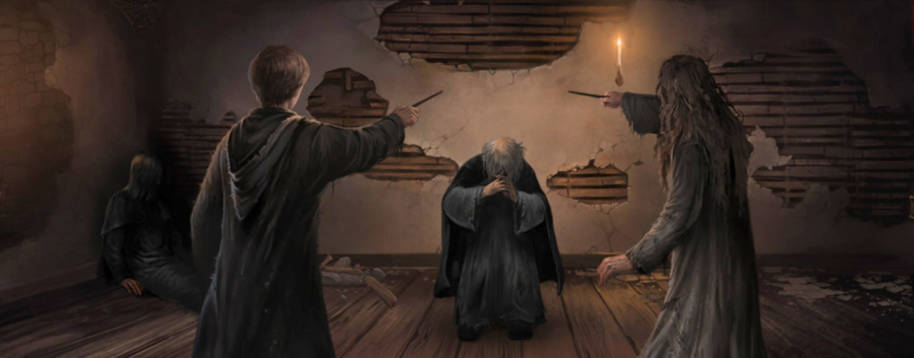
As a wrongly convicted Azkaban prisoner, it’s no surprise that Sirius often had itchy feet. Even after Harry and Hermione rescue Sirius from a soulless life kissed by Dementors, Sirius isn’t exactly a free bird once he flies away on Buckbeak. When Sirius’s old family house is needed to hold the headquarters for the Order of the Phoenix, the rebellious Marauder effectively finds himself under house arrest, due to still being known as a dangerous murderer in the wizarding world. On many occasions, we saw how frustrating this was for Sirius, especially as he had always been a bit of a rebel. So even as he encouraged Harry to greater risk-taking, it was obvious he wouldn’t mind breaking a few rules of his own.
But Sirius wasn’t just anarchic for the sake of it. Sure, as a reckless Hogwarts student it might’ve been fun sneaking around as a great black dog for thrills. But as a man, Sirius transferred those rebellious tendencies to bravery for the greater good. Here’s our case for why Sirius was one of the bravest characters of the entire book series.

Becoming an Animagus
Not only is it very difficult to transform into an animal at will, it’s also against wizarding law to do so without registering yourself as an Animagus. Not that this bothered Sirius – when he and his friends discovered Lupin was a werewolf, their reaction was not to desert him but to figure out a way to accompany him. What’s a little law-breaking against supporting your werewolf friends? When his friend’s happiness was at stake, Sirius didn’t worry about anything else, including being caught as an illegal Animagus, or maybe suffering a werewolf bite. Pretty brave, when you think about it.
Escaping his pure-blood obsessed family
Sirius clearly had a miserable childhood: the only Gryffindor in a family full of Slytherins, he was (according to Kreacher) hated by his mother for being the black sheep of the Black family. Being brought up in a pure-blood obsessed household was no picnic, and if the Malfoys were anything to go by, then straying from the family line was very rare and certainly not easily executed. But Sirius kept up a constant resistance that saw him fill his room with Muggle posters, make friends with a werewolf and, finally, run away from home at 16. These weren’t acts of childhood rebellion, they were choices. Sirius actively rejected his family’s beliefs and expectations, and that took a lot of courage.

His loyalty to his friends
That Sirius had a reckless streak was pretty obvious, and during his school days he and James spurred each other to even greater feats of rule-breaking. In Sirius’s own words they could be arrogant; occasionally they were even cruel. But Sirius’s saving grace was his loyalty to his friends – even the trick he played on Snape was in response to Snape trying to get them expelled. And his schoolboy loyalties were nothing compared to what he was willing to do in later life.
As the Potters’ potential Secret-Keeper, Sirius risked being killed by Voldemort – something he absolutely would have done, as he told Pettigrew:
‘THEN YOU SHOULD HAVE DIED! … DIED RATHER THAN BETRAY YOUR FRIENDS, AS WE WOULD HAVE DONE FOR YOU!’
Harry Potter and the Prisoner of Azkaban
However, Sirius thought the Potters would be safer with Pettigrew as their Secret-Keeper, sure that Voldemort would come after him and leave the ‘weak, talentless’ Pettigrew alone. Misguided as it was, Sirius persuading James to use Pettigrew as Secret-Keeper was motivated by concerns for his family’s safety. That Pettigrew would betray them was something Sirius never considered because, to him, loyalty was a given.

Breaking out of Azkaban
Those Azkaban years must have been the worst in Sirius’s life: wrongly imprisoned, mourning the deaths of his friends and with nothing else to think about. Sirius was also the only one who knew that Pettigrew – a former friend he had sorely misjudged – was responsible for the Potters’ deaths. Yet rather than let these feelings overwhelm him, Sirius used them to his benefit. Realising Pettigrew was at Hogwarts posing as Scabbers gave him the focus he needed to escape. And not just escape: to track Pettigrew all the way to Hogwarts, despite the fact that the school was guarded by Dementors and the whole world was looking for him.

Supporting Harry through the Triwizard Tournament
Sirius’s visits to Harry in the guise of Padfoot do show his reckless streak. He was meant to be hiding, but there he was in Hogsmeade with Buckbeak, eating stolen chicken legs. But the reason he travelled to see Harry was because he wanted to be there for him. As he used to be with his schoolfriends, so he was now with Harry: supporting his godson was much more important than his own safety.
Following Harry to the Department of Mysteries
Nowhere was this more obvious than in Sirius’s last and greatest act of bravery. That Voldemort used Harry’s affection for Sirius to lure him to the Department of Mysteries showed how close they’d become, and Sirius reciprocated by refusing to sit at home when Harry was threatened. He could have done; other members of the Order of the Phoenix responded, and being found at the Ministry of Magic would have been particularly disastrous for Sirius given he was still on the run from Azkaban. But that was never an option.
He may have lost his duel with Bellatrix, but the fact that his final moments were spent actively defending his godson was, at least, a fitting death for Sirius.


